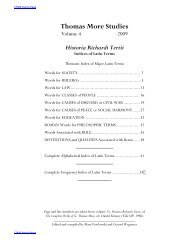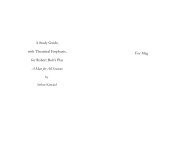life of john picus earl of mirandola - The Center for Thomas More ...
life of john picus earl of mirandola - The Center for Thomas More ...
life of john picus earl of mirandola - The Center for Thomas More ...
You also want an ePaper? Increase the reach of your titles
YUMPU automatically turns print PDFs into web optimized ePapers that Google loves.
[54]<br />
<strong>The</strong> interpretation <strong>of</strong><br />
the wonder<br />
Saint Ambrose<br />
6 <strong>Thomas</strong> <strong>More</strong>’s Life <strong>of</strong> John Picus<br />
haply° grieve him to see the <strong>life</strong> <strong>of</strong> such an excellent cunning man so<br />
far uncunningly written. ¬ 1<br />
⌐ Of his Parents and Time <strong>of</strong> his Birth. ¬ In the year <strong>of</strong> our Lord God, 2<br />
1463, Pius II 3 being then the general Vicar <strong>of</strong> Christ in His Church,<br />
and Frederick, the Third <strong>of</strong> that name, ruling the¦ Empire, 4 this noble<br />
man was born, 5 the last child 6 <strong>of</strong> his mother Julia, a woman come <strong>of</strong> a<br />
noble¦ stock, his father hight° John Francis, 7 ⌐ a lord <strong>of</strong> great honour<br />
and authority. ¬ ¦<br />
⌐ Of the Wonder that Appeared be<strong>for</strong>e his Birth. ¬8 A marvellous sight<br />
was there seen be<strong>for</strong>e his birth. <strong>The</strong>re appeared a fiery garland standing<br />
over the chamber <strong>of</strong> his mother while she travailed, and suddenly<br />
vanished away: which appearance was peradventure a token that he<br />
which should that hour in the company <strong>of</strong> mortal men be born, in<br />
the perfection <strong>of</strong> understanding should be like the perfect figure <strong>of</strong><br />
that round circle or garland; 9 and that his excellent name should round<br />
about the circle <strong>of</strong> this whole world be magnified, whose mind should<br />
always as the fire aspire upward to heavenly things, and whose fiery<br />
eloquence should, with an ardent heart, in time to come worship and<br />
praise almighty God¦ with all his strength: and as that flame suddenly<br />
vanished, so should this fire soon from the eyes <strong>of</strong> mortal people be<br />
hid. We have <strong>of</strong>tentimes read that such unknown and strange tokens<br />
hath gone be<strong>for</strong>e or followeth the nativity <strong>of</strong> excellent, wise, and virtuous<br />
men, departingº (as it were) and by God’s commandment severing<br />
the cradles <strong>of</strong> such special children from the company <strong>of</strong> other <strong>of</strong> the<br />
common sort, and showing that they be born to the achieving <strong>of</strong> some<br />
great thing. But to pass over other, the great Saint Ambrose: a swarm<br />
<strong>of</strong> bees flew about his mouth in his cradle, and some entered into his<br />
1 haply by chance, perhaps / 8 hight was called, named / 24 departing dividing<br />
¦ 6 <strong>More</strong> omits Romani: Roman. / 8 <strong>More</strong> omits her family name: Boiardo. / 8 <strong>More</strong> omits<br />
five lines <strong>of</strong> Latin text, mostly on Picus’ siblings, their spouses and children. / 20 <strong>More</strong> omits<br />
qui ignis comburens est, “Who is a consuming fire” (CW 1:296, 297).<br />
1. Stan<strong>for</strong>d Lehmberg points out that this addition (5.3-6.1) is <strong>More</strong>’s longest original passage<br />
(68).<br />
2. <strong>The</strong> Latin is Anno a partu virginis, “In the…year after the Virgin gave birth” (CW 1:294, 295).<br />
3. Pius II: Aeneas Sylvius Piccolomini (1405–1464), who became pope in 1458.<br />
4. Frederick III (1415–1493) was crowned Holy Roman Emperor in 1452.<br />
5. Picus was born 24 February 1463.<br />
6. <strong>The</strong> youngest <strong>of</strong> six, Picus had three sisters and two brothers.<br />
7. John Francis was count <strong>of</strong> Mirandola and Concordia.<br />
8. Here the original Latin has the sidenote, Prodigium, “portent” or “wonder” (CW 1:211).<br />
9. the perfect…garland: <strong>The</strong> original Latin is simply orbiculari figurae, “global <strong>for</strong>m” (CW 1:296).<br />
5<br />
10<br />
15<br />
20<br />
25











